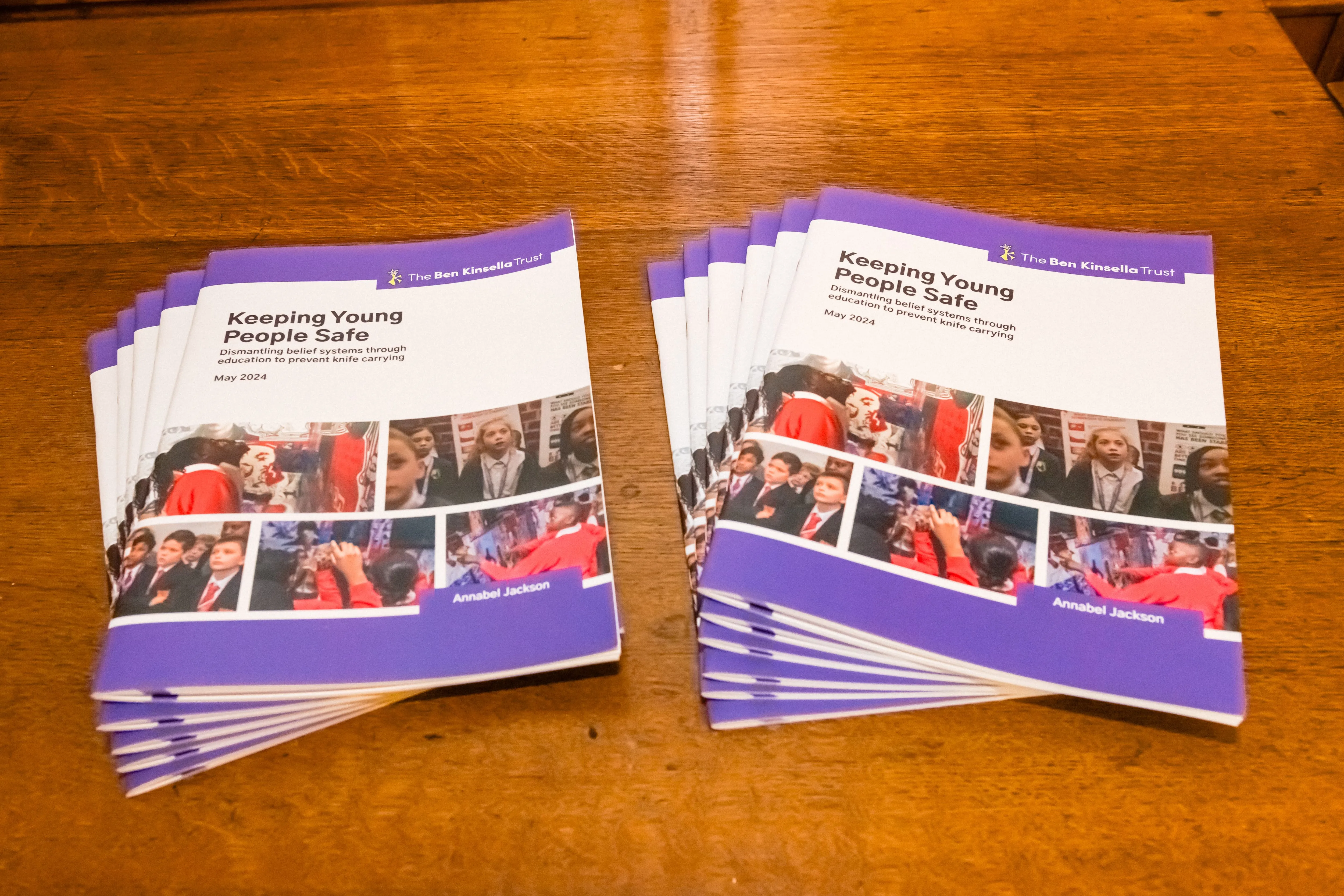
I have met with many families and community members bereaved by violence. It is clear the effect these tragic events have is profoundly felt by all impacted. The fear and anxiety these incidents instil in young people is a silent epidemic that must be addressed with urgency.
The Ben Kinsella Trust’s recent report, Keeping Young People Safe (2024), surveyed over 9,500 young Londoners and revealed some alarming statistics. A staggering 36% of young people – over a third - reported that they did not feel safe in their area. Furthermore, 64% - nearly two thirds – said they were anxious or worried about knife crime. In a separate BBC Bitesize survey of over 2,000 UK teenagers, 31% were concerned about knife crime in schools (2024).
36% of young people do not feel safe in their area. 64% are anxious or worried about knife crime and 31% are concerned about knife crime in schools.
These figures underscore the pervasive fear that knife crime has created amongst young people; but this fear is disproportionate to the actual levels of knife crime in most areas. This disconnect between perception and reality can lead to dangerous behaviours, such as carrying a knife for perceived protection. We know that statistically, a person is more likely to be harmed if they carry a knife, but this myth of protection is held by many of the young people who we work with. Our Keeping Young People safe report reveals that 24% of young people believe that carrying a knife would protect them. While only 2% admitted to carrying a knife, this data highlights the vulnerability of some young people to the idea of self-defence through carrying weapons. Encouragingly, this harmful belief around knife-carrying offering protection is significantly reduced after visiting our exhibition and participating in a Ben Kinsella Trust Choices & Consequences workshop: The number of young people who thought carrying a knife would protect them dropped from 24% to 5%.
To combat the fear of knife crime and to prevent young people from making risky decisions, we must adopt a more empathetic and nuanced approach. Simply telling young people what to do or showing them frightening images is unlikely to be effective, and some research has shown these approaches to be counterproductive. Instead, we must listen to young people’s concerns, acknowledge their fears, and build trust through empathy. When young people are treated as equals, respected, and listened to by the adults in their lives, they are more likely to listen to guidance around safety.
Thankfully, most young people have not personally experienced ‘knife crime’ or serious violence, with most young people having concerns around issues or conflict with peers instead. Although, we know that sometimes issues between peers can escalate into more serious harms online or in-person, such as bullying, abuse, violence and in the worst possible cases, even death. By reframing the conversation from ‘knife crime’ to ‘staying safe’, we can create a more positive and empathetic environment for young people to learn, problem-solve and access support. By using positive imagery and avoiding traumatising language, we can help young people think differently about their situation and the choices they make.
By reframing the conversation from 'knife crime' to 'staying safe,' we create a more positive and empathetic environment for young people.
Most young people know how to stay safe and have many practical strategies in how to de-escalate conflict with peers, but in the face of peer pressure or operating from the survival part of their brain it can be harder to make decisions and navigate situations safely. Often it is the understanding words, support and guidance from a trusted adult that empowers them to make the right choices in difficult circumstances.
As adults who support young people, we can help them to feel better equipped to handle challenging situations for themselves. This is not about us liberating responsibility for young people’s safety. It is about helping young people to better trust their instincts, fostering a sense of autonomy and equipping them with skills whilst also helping them to understand who else can help them.
An effective strategy is focusing on the positive aspects of self-awareness and personal safety. We can help young people develop their emotional intelligence and highlight the importance of trusting their instincts, thinking ahead, and speaking to a trusted adult about their concerns.
Emotional intelligence is our ability to recognise, interpret and process emotions in ourselves and others. A key part of developing this is self-awareness, getting to know yourself, your triggers and trusting your instincts. Improved emotional intelligence can also help with building resilience, decision-making and problem-solving; all fundamental elements of staying safe in certain situations. We can help young people develop this in several ways, by modelling appropriate emotional responses, increasing emotional literacy, showing empathy and teaching healthy coping skills in the face of adversity.
Young people usually know when a situation is about to become dangerous and when to avoid it. However, when operating from a fight or flight perspective it can be harder to navigate. Young people can be encouraged to trust their gut instincts and understand how effective these instincts are in keeping them safe. Our stomachs are colloquially known as our ‘second brain’ and can play a powerful part in keeping us safe.
The Gut-Brain Axis is a recognised communication system that allows messages to be passed from our gut to our brain and vice-versa. The messages linked to our threatened survival can feel different for everyone; like butterflies, churning or knots. However, they can all be described as a ‘gut-feeling’ or instinct. Our brains sometimes override and reason with these feelings, giving us thoughts such as ‘you’re overthinking this’ or ‘you’re making a something out of nothing’. I say this to everyone and anyone who will listen, no matter their age; our belly is our best friend, trust it.
Trust your gut - it's your best friend. Our instincts are powerful tools in keeping us safe.
Often some young people don’t think about their future in the long term but can effectively consider the consequences of their choices in shorter time scales. Asking young people to take a breath and take a step back helps them to engage their ‘thinking brain’ if they are in a conflict situation. They can then effectively ask themselves ‘where do I want to be in five minutes?’. Will they want to be in a physical fight with a peer? Or involved in an argument online with a friend? Most likely not. By taking a step back to consider the consequences it gives a young person the time and headspace to work out how to resolve the conflict and seek guidance from a trusted adult if they cannot work through it alone.
By emphasising these factors, we can equip young people with the ability to take control of their lives and make informed decisions.
Asking young people ‘Where do I want to be in five minutes?’ helps them step back and avoid risky decisions.
Who are the trusted adults in a young person’s life? For some it may be their parents or carers, a youth mentor or teacher. Sadly, for some young people they might not feel there are any adults in their lives who can offer support and guidance. Sometimes, a young person might not be able to visualise all the people in their communities that can support them safely and give them someone to talk to when they need to. We can all advocate for a young person in helping to find those adults that play a key part in enhancing the protective factors in a young person’s life by exploring safe spaces in the community, local youth services and parenting support from local authorities.
In conclusion, tackling the fear and impact of knife crime on young people requires a multifaceted approach that goes beyond simply telling them what to do. By fostering emotional intelligence, self-awareness, and trust in their instincts, we can empower young people to navigate conflict and stay safe. It's essential to build trusting relationships where young people feel listened to and respected, enabling them to make informed decisions. We must also ensure they have access to supportive adults and safe spaces within their communities. By focusing on positive reinforcement and empathetic engagement, we can help young people not only stay safe but also help them to build a positive future.

Anoushka Dunic
Training Programmes Manager, The Ben Kinsella Trust
www.benkinsella.org.uk
